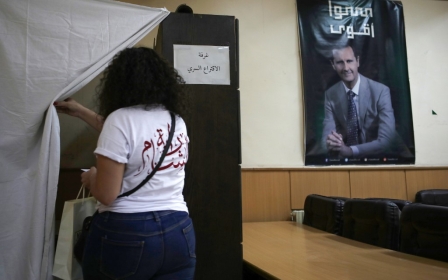Syria's sham elections reveal shifting loyalties

Though Syria's parliamentary elections on Sunday were anything but free, with loyalists to President Bashar al-Assad guaranteed victory, they nonetheless have revealed a shift in favouritism and influence, analysts told Middle East Eye.
Beyond the photoshoots of Assad voting while wearing a coronavirus mask and the cosmetic pretence of democracy, the poll results serve as a window for understanding the state of power inside Syria, they said.
Syria's parliament is essentially toothless, with Assad holding all the levers of power. It's a situation that leaves the elections as effectively "meaningless", according to Yazan al-Saadi, a Syrian-Canadian writer based in Beirut.
'Previously, there would be a sizeable turnout but the lack of participation could be a signifier of people losing interest and hope'
- Rim Turkmani, analyst
"You can follow any ideology, even if you are a Salafist or a fascist, so long as you support Assad and the sustainability of the regime, you are welcome," he told MEE.
And the paltry turnout of 33 percent suggests that many Syrians elegible to vote - millions in opposition areas or living as refugees abroad had no such rights - felt the same.
New MEE newsletter: Jerusalem Dispatch
Sign up to get the latest insights and analysis on Israel-Palestine, alongside Turkey Unpacked and other MEE newsletters
"Previously, there would be a sizeable turnout but the lack of participation could be a signifier of people losing interest and hope," Rim Turkmani, director of the Syria Research Programme at the London School of Economics, told MEE.
"Fears around Covid and the hot weather may have impacted turnout, but it didn't stop people doing other things like socialising and shopping."
Losing loyalists
Unsurprisingly, results trickling through this week have shown Assad's Baath party winning a majority - Assad and candidates on the "national unity" list took 177 of the 250 seats. But there have been some shocks.
Prominent loyalist Fares Shehabi, an Aleppo businessman with a large online presence who has once threatened to kill an MEE journalist, lost his seat to Hussam Katerji, who reportedly facilitated oil sales between the Islamic State group and Assad's government.
Shehabi did not take it well, saying he was the victim of a "malicious plot" and had he "lost in transparent and clean elections, it would have been different".
"The message was clear: blind obedience to the growing system of corruption or exclusion and punishment," Shehabi wrote on Facebook.
Other supporters who made it into parliament include members of the Berrih family, who rounded up protestors in the early days of the Syrian revolution in Aleppo and used young boys selling roses to gather intelligence.
According to Turkmani, "it seems that people who made money during the war have made it into this sad pathetic parliament".
Zaki Mehchy, co-founder of the Syrian Center for Policy Research, warned the elevation of Katerji and his ilk should not be taken too seriously, because ultimately Assad won't let anyone around him cultivate too much power.
"Its not about Katerji, because the last three months showed that the regime was able to to get rid of Rami Makhlouf, a businessman who was even more powerful than Katerji," Mehchy told MEE.
"Katerji is only a tool and one of many cronies used in this theatre by the regime to present itself as a legitimate authority," he added.
"Cronies like Katerji are only tools for the regime and its institutions to make money and sustain their authority."
Political theatre
Candidates were reportedly handpicked by Assad's Baath party, the Iranian Revolutionary Guard and a host of pro-government militias. Russia, too, is thought to have promoted prospective MPs.
Foreign sponsorship does not mean leverage over the government, however.
"Survival is dictated by the Assad regime itself. The Russians and Iranians exert power, but ultimately if it goes against [the regime's] interest, then they won't do it," said Saadi.
'The regime is trying to show its cronies that no matter how much their role in Syria grows, ultimately it is the regime that facilitates or revokes their access to power and resources'
- Lina Khatib, analyst
On a surface level, polling day was a platform for politicians to appear proactive about coronavirus and the crippling economic situation.
Sunday also saw the first public appearance of Imad Khamis, who Assad removed as prime minister last month. It had been speculated he was under house arrest.
Lina Khatib, who leads the Middle East and North Africa programme at Chatham House, said such pieces of political theatre are used by Assad's government to remind its supporters exacty who's in charge.
"Historically, the Assad regime has used the elections to send a message to the cronies it has been relying on throughout the conflict to support its economic and military affairs that it still has upper hand in this relationship, despite its increasing dependency on these cronies," Khatib told MEE.
"The regime is trying to show its cronies that no matter how much their role in Syria grows, ultimately it is the regime that facilitates or revokes their access to power and resources."
Middle East Eye delivers independent and unrivalled coverage and analysis of the Middle East, North Africa and beyond. To learn more about republishing this content and the associated fees, please fill out this form. More about MEE can be found here.





